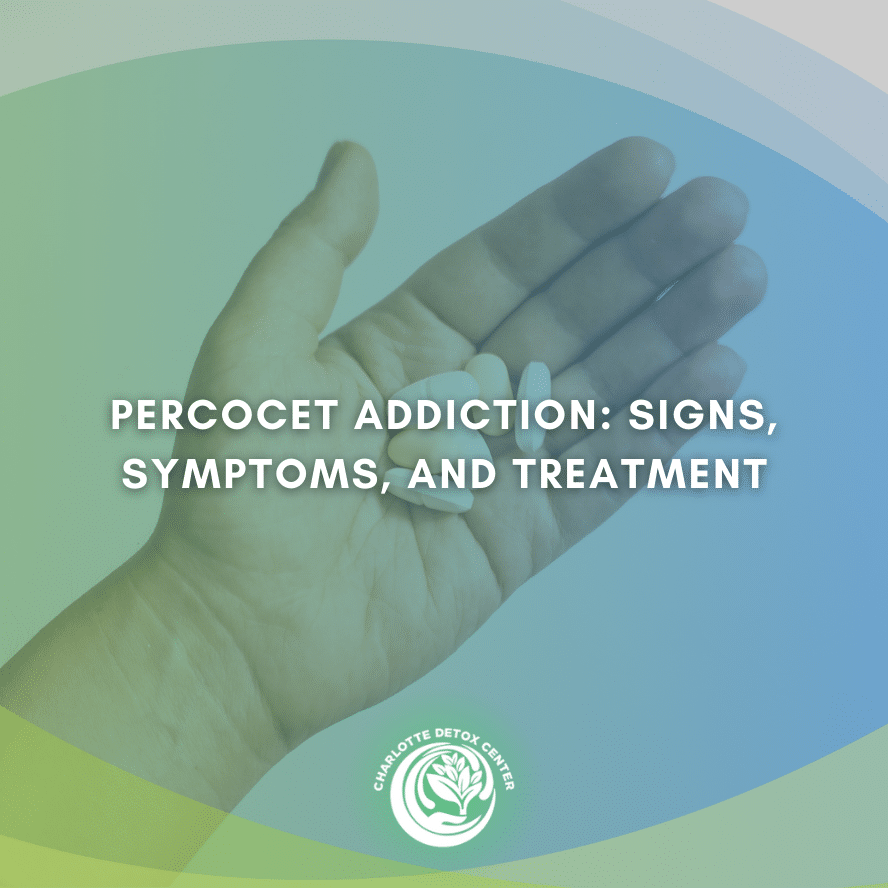Percocet Addiction: Signs, Symptoms, and Treatment

Medically Verified: 2/1/24
Medical Reviewer
Chief Editor

All of the information on this page has been reviewed and verified by a certified addiction professional.
The United States is in the midst of an opioid crisis that has been building for decades. According to the CDC, about 136 people die each day from an overdose of opioids.[1] This puts the fatality rate of opioids higher than that of motor vehicle accidents. More people die from prescription opioids each day than all illegal drugs combined.
Any addiction is devastating. Prescription drug addiction affects many people without addiction risk factors or previous experience with substance abuse. Many people believe that the medications their doctor prescribes are perfectly safe. However, prescription opioids, including Percocet, can be highly addictive and must be used only under strict supervision.
Anyone who uses prescription opioids like Percocet may develop an addiction. It is crucial to understand the signs of Percocet abuse and addiction and know when to seek opioid addiction treatment.
If you or someone you love live with Percocet addiction or you want to learn more about opioid rehab, reach out to the admission staff at Charlotte North Carolina Detox for more information.
What is Percocet (Oxycodone/acetaminophen)?
Percocet is a potent prescription pain reliever used to treat moderate to severe pain. This medication combines two ingredients: Oxycodone and Acetaminophen–the main ingredient in Tylenol. This powerful combination of drugs can effectively relieve pain related to surgery, injury, or chronic conditions.
Percocet is classified as a Schedule II drug, meaning that it is highly regulated and controlled by the FDA but is known to have a medical use. Only Schedule I drugs–those that are illegal and have no known medical purpose–are more heavily regulated.
Percocet should be taken exactly as prescribed and only be used under strict supervision. If you begin to take it differently than prescribed, you must inform your doctor right away.
Understanding Percocet Abuse
In addition to having less pain, people who take Percocet may also experience a sense of euphoria, relaxation, or a “high” feeling. These pleasurable side effects sometimes prompt people to use Percocet differently than prescribed. A person may take more Percocet than recommended or may continue to take the medication long after their pain subsides.
Taking higher doses of Percocet or using it for an extended period can lead to tolerance. Tolerance means needing more of the medication to get the same effects and is a benchmark of addiction.
Research performed in 2014 estimated that about 4.3 million people met the criteria for prescription drug abuse.[2] Of the millions of people who abuse Percocet and other prescription opioids, some will develop an addiction that requires opioid addiction treatment.
Recognizing Percocet Addiction
When used as prescribed, Percocet is taken by mouth. When people abuse Percocet, they may take it in pill form, snort or smoke it, or inject it. When the medication enters the bloodstream, it quickly crosses into the brain and causes a flood of dopamine. Dopamine is a neurotransmitter involved in pleasure and reward. It plays a key role in addiction.
When the brain becomes accustomed to the flood of dopamine, people may experience withdrawal or cravings when they do not take Percocet. With prolonged or heavy Percocet abuse, a person may quickly develop tolerance or dependence on the drug. People who abuse Percocet are at increased risk of overdose.
Percocet addiction can cause emotional, behavioral, and physical changes. People who abuse Percocet may engage in risky behaviors while under the influence of the drug. They may also experience physical symptoms, including:
- Dizziness
- Irritability
- Headache
- Chills
- Runny nose
- Dilated pupils
- Watery eyes
- Yawning
- Elevated blood pressure
Some of the behavioral symptoms of prescription drug addiction include:
- Using more of the drug than recommended
- Inventing symptoms to get a prescription for Percocet
- Having multiple doctors who prescribe Percocet
- Using Percocet recreationally
- Continuing to use despite negative consequences
- Falling behind at work, school, or home
- Experiencing legal or financial trouble related to drug use
If you or someone you love are experiencing symptoms of Percocet addiction, get the treatment you need as quickly as possible.
What Happens During Percocet Addiction Treatment?
Opioid addiction treatment happens in stages. Because addiction is not simply a physical condition, people must receive treatment for the emotional, behavioral, and environmental aspects of the condition, too.
First, addiction specialists will conduct an evaluation that allows them to create an individualized treatment plan. For many people, the next step will be going through a medically-supervised detox program.
After completing drug detox, people begin an opioid rehab program. This generally includes a combination of evidence-based and holistic treatments that address and treat the complex roots of a person’s addiction. These treatments include:
- Individual therapy
- Group therapy
- Education
- Medications
- Family therapy
- Mental health and medical care
- Holistic treatments like art therapy, yoga, acupuncture, mindfulness practice, and other therapies can support healing
After treatment, people must develop an aftercare plan to help them stay engaged and active in their addiction recovery for life.
Find Help for Percocet Abuse or Addiction Today
Opioid abuse and addiction can be dangerous and even life-threatening, but there is help available. For more information about our opioid addiction treatment program or other substance abuse treatment programs, reach out to Charlotte North Carolina Detox specialists today.
References:
